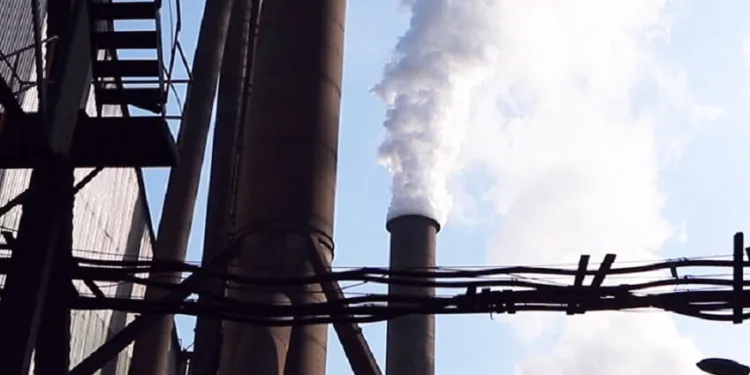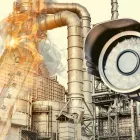News & Events

HIKVISION TECHNOLOGY HELPS STEEL MAKER TO IMPROVE EMPLOYEE SAFETY AND EFFICIENCY
“In the past, blast furnace inspections were completely manual. Workers needed to use a temperature gun to detect the surface temperature of the furnace, spending a lot of time. Moreover, there were many safety hazards such as gas poisoning and fall injuries. So we have to figure out effective solutions to protect employee health and safety in this dangerous process,” said Yin Fengwei, a native of Anshan and the general manager of the Anshan branch of Yutai Security.
The steelmaking process is very complicated. Putting the ore into the furnace to make into iron, and then into a piece of steel, requires dozens of processes. During these processes, regular inspection and maintenance of furnaces is the top priority. In the past, inspectors had to climb tens of meters up each furnace, hourly, and measure its temperature with an infrared thermometer gun to prevent accidents caused by overheating. High temperature, poisonous gas, and splashing iron flowers made this working environment totally unfriendly to them. Once the equipment fails, it will not only cause financial loss, but may also cause casualties.
Some leading enterprises in the steel industry are striving to overcome the challenges and boost a new mode of production. For example, Angang Steel adopted Hikvision’s automatic temperature measurement solution to help the workers get further away from accidents and dangers, but closer to efficient and safe working conditions.
Located in the heavy industry base in Northeast China, Angang Steel has a long history and a key role in the industry. In recent years, Angang Steel has actively tried innovative solutions for intelligent manufacturing and to solve problems of health and safety.
Take the inspection and maintenance of blast furnaces as an example. Since 2019, Hikvision and the local partner, Yutai Security, have helped Angang Steel to apply thermal imaging to ironmaking blast furnaces. By evaluating the intensity of infrared radiation emitted from objects, thermal cameras have been used in detecting temperature anomalies before a fire starts. They find hot spots and invisible defects on machinery or electrical systems that could indicate a potential problem. They also perform non-contact measurements at the areas that are hard to reach manually.
Through the real-time connection between front-end thermal imaging instruments and a back-end system, inspectors could use video streams from different positions in a furnace and monitor the temperature changes in specific areas of the furnace shell, generate reports, and receive timely warnings of temperature irregularities. Apart from the improved working environment, productivity has been raised too.
The system is like a “dedicated doctor” for blast furnaces, which automatically measures temperature, generates reports, and also allows workers to search and compare historical data and monitor changes in the furnaces by receiving real-time alerts.
Besides the automatic temperature measurement of ironmaking blast furnaces, digital and intelligent solutions in the whole process of steelmaking help workers to remotely perceive complex production sites and schedule the production in real time.
Hikvision uses thermal imaging technology to conduct real-time online monitoring of hot blast stoves. In addition, other types of sensors can be used to inspect the operating status of the equipment more accurately. Based on that, early alarms of potential security risks will be raised in the shortest time.
In Angang Steel’s steelmaking workshop, the production process can be viewed remotely through Hikvision intelligent video devices and large screens. Through outstanding image brightness processing, high frame rate imaging, and other technologies, the image of molten steel dumping and desulfurization process in high-temperature and high-brightness environments can be generated, and then transmitted to the back end, allowing the workers to view and evaluate the production status in time and ensure the product quality.
“Manual detection is definitely incomparable with intelligent monitoring, as it is difficult to reflect the real-time situation and not possible to give an effective early warning. With the Hikvision system installed, we can now obtain key data from the blast furnaces, which can be accurately recorded and easily searched on the computer. For example, we can clearly see and check whether the insulation material is thinning or even falling off. This ensures the seamless progress of production and the safety of the workers,” said Yin Fengwei.
In terms of production logistics, Hikvision uses AI, Optical Character Recognition (OCR), and other technologies to strengthen Angang Steel’s ability to recognize key information in related processes. For example, the one-button counting function can trigger the video data analysis on the weight and the quantity of the materials. The analysis results can be cross-checked with the existing weight data and the quantity data recorded manually. Then the system can automatically print the information labels of the materials.
In addition, Hikvision uses multi-dimensional perception technology to monitor and control the vehicles in the factory intelligently. For example, the fusion of video and radar data can detect vehicle violations by recognizing abnormal speed or driving trails. It provides safety supervision departments with feedback on vehicle violations and abnormal conditions in the factory, and discovers the potential risks of vehicle transportation in advance.
Hikvision has been continually developing solutions t0 respond to the needs of the enterprise users in the steel industry, with solid R&D and rich scenario-based capabilities. Its intelligent technologies are helping more and more steel plants to improve quality and efficiency, as well as alleviating the workers’ workload in harsh working environment and help them work safer and more efficiently.
Source: Hikvision
The steelmaking process is very complicated. Putting the ore into the furnace to make into iron, and then into a piece of steel, requires dozens of processes. During these processes, regular inspection and maintenance of furnaces is the top priority. In the past, inspectors had to climb tens of meters up each furnace, hourly, and measure its temperature with an infrared thermometer gun to prevent accidents caused by overheating. High temperature, poisonous gas, and splashing iron flowers made this working environment totally unfriendly to them. Once the equipment fails, it will not only cause financial loss, but may also cause casualties.
Some leading enterprises in the steel industry are striving to overcome the challenges and boost a new mode of production. For example, Angang Steel adopted Hikvision’s automatic temperature measurement solution to help the workers get further away from accidents and dangers, but closer to efficient and safe working conditions.
“Dedicated doctor” for blast furnaces
Located in the heavy industry base in Northeast China, Angang Steel has a long history and a key role in the industry. In recent years, Angang Steel has actively tried innovative solutions for intelligent manufacturing and to solve problems of health and safety.
Take the inspection and maintenance of blast furnaces as an example. Since 2019, Hikvision and the local partner, Yutai Security, have helped Angang Steel to apply thermal imaging to ironmaking blast furnaces. By evaluating the intensity of infrared radiation emitted from objects, thermal cameras have been used in detecting temperature anomalies before a fire starts. They find hot spots and invisible defects on machinery or electrical systems that could indicate a potential problem. They also perform non-contact measurements at the areas that are hard to reach manually.
Through the real-time connection between front-end thermal imaging instruments and a back-end system, inspectors could use video streams from different positions in a furnace and monitor the temperature changes in specific areas of the furnace shell, generate reports, and receive timely warnings of temperature irregularities. Apart from the improved working environment, productivity has been raised too.
The system is like a “dedicated doctor” for blast furnaces, which automatically measures temperature, generates reports, and also allows workers to search and compare historical data and monitor changes in the furnaces by receiving real-time alerts.
Intelligent steelmaking through remote operation
Besides the automatic temperature measurement of ironmaking blast furnaces, digital and intelligent solutions in the whole process of steelmaking help workers to remotely perceive complex production sites and schedule the production in real time.
Hikvision uses thermal imaging technology to conduct real-time online monitoring of hot blast stoves. In addition, other types of sensors can be used to inspect the operating status of the equipment more accurately. Based on that, early alarms of potential security risks will be raised in the shortest time.
In Angang Steel’s steelmaking workshop, the production process can be viewed remotely through Hikvision intelligent video devices and large screens. Through outstanding image brightness processing, high frame rate imaging, and other technologies, the image of molten steel dumping and desulfurization process in high-temperature and high-brightness environments can be generated, and then transmitted to the back end, allowing the workers to view and evaluate the production status in time and ensure the product quality.
“Manual detection is definitely incomparable with intelligent monitoring, as it is difficult to reflect the real-time situation and not possible to give an effective early warning. With the Hikvision system installed, we can now obtain key data from the blast furnaces, which can be accurately recorded and easily searched on the computer. For example, we can clearly see and check whether the insulation material is thinning or even falling off. This ensures the seamless progress of production and the safety of the workers,” said Yin Fengwei.
More technologies for an intelligent steel plant
In terms of production logistics, Hikvision uses AI, Optical Character Recognition (OCR), and other technologies to strengthen Angang Steel’s ability to recognize key information in related processes. For example, the one-button counting function can trigger the video data analysis on the weight and the quantity of the materials. The analysis results can be cross-checked with the existing weight data and the quantity data recorded manually. Then the system can automatically print the information labels of the materials.
In addition, Hikvision uses multi-dimensional perception technology to monitor and control the vehicles in the factory intelligently. For example, the fusion of video and radar data can detect vehicle violations by recognizing abnormal speed or driving trails. It provides safety supervision departments with feedback on vehicle violations and abnormal conditions in the factory, and discovers the potential risks of vehicle transportation in advance.
Hikvision has been continually developing solutions t0 respond to the needs of the enterprise users in the steel industry, with solid R&D and rich scenario-based capabilities. Its intelligent technologies are helping more and more steel plants to improve quality and efficiency, as well as alleviating the workers’ workload in harsh working environment and help them work safer and more efficiently.
Source: Hikvision




